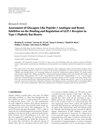In Vitro Investigation and Evaluation of Novel Drug Based on Polyherbal Extract against Type 2 Diabetes
引用次数: 18
Abstract
Background/Aim. Type 2 diabetes is the most common form of diabetes mellitus. The aim of this study was to develop and standardize the polyhedral formulation (granule) and check its efficacy with regard to type 2 diabetes. Methods. The alcoholic extract of each plant (H. antidysentrica, Prunus dulcis and Cicer arietinum) and oleic acid was mixed and then formulated by wet granulation method. FTIR was done to investigate the presence of active compounds. Physicochemical properties of granules were evaluated and antidiabetic potential was substantiated through inhibition of carbohydrate digestive enzyme (α-amylase and α-glucosidase), glucose uptake activity in yeast cells, and antioxidant activity. Results. IR spectra indicated the presence of active compounds by showing the characteristic peaks of phenols and amines. The FTIR results also showed no interaction between drug and excipients. The prepared granules exhibited excellent flow properties according to USP 30. The dissolution profile of active pharmaceutical ingredient (API) from granules showed 72–80% release in 2 hrs. Granules exhibited better inhibition of α-amylase and α-glucosidase as in comparison with the standard drug and found to be dose-dependent. The enhanced uptake of glucose was observed with a decrease in drug concentration. Moreover, the DPPH scavenging activity was high (98%) at 1 mg/ml. Conclusion. The stabilized formulation (granules) was formed and the presence of active compounds is responsible for better antidiabetic activity by inhibiting carbohydrate-digesting enzymes. Hence, it could lower the postprandial hyperglycemia and has the potential to be used for the treatment of type II diabetes after determining the dose regime.复方提取物抗2型糖尿病新药的体外研究与评价
背景/目的。2型糖尿病是最常见的糖尿病。本研究的目的是开发和规范多面体配方(颗粒),并检查其对2型糖尿病的疗效。方法。采用湿制粒法,将各植物(抗苦枝、桃李、金丝桃)的酒精提取物与油酸混合配制。用FTIR研究了活性化合物的存在。通过对糖酶(α-淀粉酶和α-葡萄糖苷酶)、酵母细胞葡萄糖摄取活性和抗氧化活性的抑制,对颗粒的理化性质进行了评价,并证实了其抗糖尿病的潜力。结果。红外光谱通过显示酚类和胺类的特征峰来指示活性化合物的存在。FTIR结果也显示药物和辅料之间没有相互作用。根据usp30,制备的颗粒具有良好的流动性能。活性药物成分(API)在2 h内释放72 ~ 80%。颗粒对α-淀粉酶和α-葡萄糖苷酶的抑制作用优于标准药物,且呈剂量依赖性。随着药物浓度的降低,葡萄糖的摄取增强。此外,在1 mg/ml时,DPPH清除活性高(98%)。结论。形成了稳定的配方(颗粒),活性化合物的存在通过抑制碳水化合物消化酶而具有更好的抗糖尿病活性。因此,它可以降低餐后高血糖,在确定剂量方案后,有可能用于治疗2型糖尿病。
本文章由计算机程序翻译,如有差异,请以英文原文为准。
求助全文
约1分钟内获得全文
求助全文

 求助内容:
求助内容: 应助结果提醒方式:
应助结果提醒方式:


